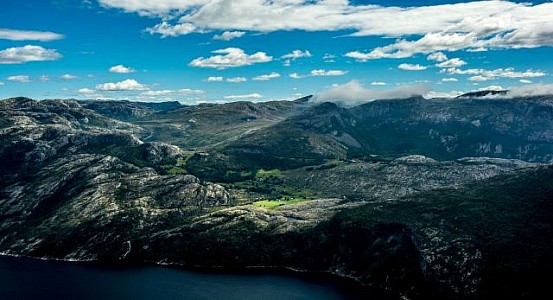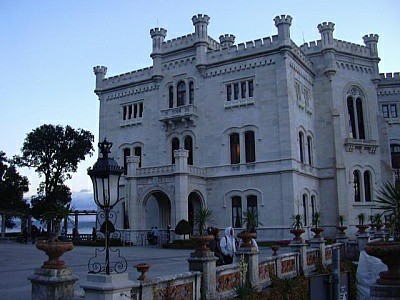[亨利梅因:国际法Lecture6]LECTURE VI. THE DECLARATION OF PARIS.One point of considerable interest in International Law is the very different degree of durability which the various parts...+阅读
LECTURE VII. THE MITIGATION OF WAR.
The age in which International Law was born was an age of land wars. The wars of succession and of feudal ascendancy had partially died out, but the Reformation brought with it a new fury of fighting, and the wars of religion were among the most ferocious that mankind had waged. Armies did not then so much consist of rival potentates, as of hosts in which each individual detested every man on the generally believed to he culminated in the siege of Magdeburg. There is a famous passage of Grotius about the licence of fighting which he saw around him; and though the dates forbid us to see here with solve writers any allusion to the siege of Magdeburg, there seems little doubt that the stories of the horrors which became current ge a new point to the speculations of Grotius and his school. Until very recent times there is great ground for distrusting the accuracy of the figures which purport to represent the amount of slaughter at battles and sieges. It is said, however, that the population of Magdeburg, which was taken by storm, was reduced from 25,000 to 2,700. The siege is described by an English eyewitness, whose account of it, generally regarded as authentic, constitutes those 'Memoirs of a Calier' which are generally embodied in the works of Defoe. The writer states that out of 25,000 men, and some said 30,000, there was not after the storm a soul to be seen alive till the flames drove those that were hid in vaults and secret places to seek death in the streets rather than perish in the fire. Of these miserable creatures too some were killed by the fierce soldiers, but at last they sed the lives of such as came out of their cellars and holes, and so about 2,000 poor desperate creatures were left. There was little shooting. The execution was an cutting of throats and mere house murders. Later historical information tends on the whole to relieve the memory of Count Tilly, the mander of the besiegers, from the infamy which has hitherto attached to it; but all sieges in that day were to the last degree homicidal, and there is a general impression that the peculiar ferocity of the soldiery after the capture of a town by storm was due to the Tartars, who had twice overrun what were then the most fertile and civilised portions of the world, and who never spared the population of the town which had resisted them. They appear to he considered that every stratagem and every degree of bad faith was justifiable for the purpose of inducing the garrison to surrender, but in the long run they never spared any man. Nor he the countries in which these massacres took place ever wholly recovered from them. So far, indeed, as the centre and west of Europe are concerned, there is visible a calming down of these bitter extremities of war as soon as Grotius, with perhaps a few predecessors and a series of successors, began to write. I he already several times referred to his method. He was guided, as it seems, principally by what he supposed to be examples and precedents. He was a man of great learning according to the particular standards of learning which prevailed in that day; but the critical treatment of history had not begun, and the worst of the pile of innumerable examples which are collected in the 'De Jure Belli et Pacis' is that we cannot be sure of the authenticity of the accounts of them which are found in the books of ancient writers. Grotius digested these precedents. He separated the most humane from the most ferocious, performing the function of separation by applying to the mass of matter before him, first of all the test of religious teaching as he found it in the Scriptures, and next the principle of what the Romans called the Law of Nature. The method of his immediate successors has been substantially the same; but in our day some scepticism has arisen, not so much as to the philosophical value of the process as with regard to its practical results. In modern international writings you may sometimes find it said that the softening of the usages of war was not so much due to Grotius, or to writers who came after him, as to the growing humanity of military manders. It is true that among the successors of Grotius there is a great variety in the degree of humanity which characterizes them. Puffendorf and Bynkershoek are inferior to Vattel in gentleness, and in the wish to prefer the more humane to the queller usage, but beyond parison the most humane of the publicists is Vattel, a Swiss. There is, however, very good reason to suppose that it was the writings of the publicists which most encouraged the humanity of war. They all followed Grotius in professing unbounded respect for the Roman conception of the Law of Nature. Philosophically that principle is now not much cared for; but the supposed rules of the Law of Nature were applied by another set of writers to another subject matter. There was a gradual growth all over continental Europe in the eighteenth century of respect and reverence, and even enthusiasm, for humanity, and you may perceive that on the whole the persons who experienced, or pretended to experience, this feeling, were: believers in the Law of Nature. The chief of them was that famous man the whole of whose philosophy, political, social, and educational, was based on the Law of Nature, Jean Jacques Rousseau. It seems in truth, apart from what the opinion of scholars may he been, that there was always a close association between the Law of Nature and humanity, and that by their constant profession of applying that law and of easily distinguishing its dictates from one another the international writers did materially increase the gentleness of mankind even when their passions were most excited.
The wars of the last part of the seventeenth and most of the eighteenth century were nal wars. A great amount of law grew up while they were continuing. One chief reason why, on the whole, nal usages are reasonable and humane is, that the belligerents were checked by the neutrals. In land wars a neutral can only affect proceedings to which he objects by taking part in the strife; but from the very first the belligerent maritime Powers were prevented from going to the full lengths of predatory destructiveness by the authority of prize courts. It is, however, quite true that the manders of land forces did gradually abandon the ferocity with which Tilly has been reproached. There was no more humane mander on the whole than our own Duke of Wellington. It is singular, at the same time, that he constantly falls into an error with which English lawyers are specially charged, that of confounding military law, which is regulating law, with martial law, which means the will of the officer manding. He always spoke of the law of war as consisting in the volition of the mander of the Forces.
The first great attempt which was made after the epoch of Grotius to give general fixity and to humanise the law of land war, was made almost in our day by an unfortunate sovereign to whom justice has never been fully done, Alexander II of Russia. He does seem to he been animated, as were both the statesmen and literary men occasionally in the eighteenth century, by an enthusiasm for humanity. You are all aware that almost immediately after his succession to the Russian throne he abolished serfdom; but his efforts to reform International Law, and specially the usages of war, are less remembered. He joined in promoting the Geneva Convention, of which I shall say much presently; he was the author of the proposal for renouncing the use of certain weapons which caused wounds of unusual painfulness; and he was the sovereign who summoned and who took an unflagging interest in the
Brussels Convention of 1874. The Brussels Convention failed, and we sh

all find, I think, hereafter that the reasons why it failed are remarkably instructive. I will say that one of the grounds for its not ing to maturity was, that it was menced too soon after one of the greatest of modern wars, which probably never had a rival in the violence of the passions which it excited. England before the Convention met had stipulated for the omission of all discussion of the rules of nal war. These, I suppose, were considered to he been sufficiently settled for the day by the Declaration of Paris; and at the close of the discussions of the Conference, when even its members admitted that they had been able to agree on a very small part of the matters submitted to them, it was the English Foreign Secretary of State, Lord Derby, who finally ge the Convention its deathblow. Undoubtedly the smaller Powers of Europe, and the Powers which he not yet taken up the system of great armies raised by conion, had very serious reasons for objecting to many of its suggestions, which had not unnaturally sprung up in the minds of military men who sympathised either with France or with Germany in the war which a few years before had been brought to a conclusion. The Brussels Conference had, however, one result which had great importance and interest. Just at the close of the American War of Secession the United States had prepared a Manual of Rule and Usage for the use of their officers in the field. This example —— the formation of a practical Manual stating for the officers of each nation what contingencies they were to be prepared for in actual contest and how they were to deal with them —— was followed by Germany, by England, and by France? and some of these Manuals he been adopted by smaller Powers. But they were all greatly affected by the remendations of the Conference of Brussels; and in reality it may be said that wherever there was anything like an approach to unanimity in the decisions and votes of the Conference, it is adopted in this somewhat irregular form by the greater part of the nations of the world.
The Manual prepared for English officers, which was, I believe, chiefly piled by the present Lord Thring, then the official draftsman of the British Government, is one of the best. Visibly the writer has taken all that he could take from the humaner doctrines of the publicists, more particularly from Vattel, but he never pretends to lay down authoritatively the law, which he nevertheless declares in such a form that it is now possible for a student of law to read it and to gain from it a very vivid notion of what a land war in which England was engaged would be like if unhappily it occurred. I will proceed to read to you certain passages from this Manual, taking portions at the same time from other Manuals, and making some remarks as I go on upon the older history of the customs of war of which it treats. I am sorry to say that the British Government has not thought fit to allow it to be published, and therefore I am afraid it cannot be procured. It begins with a statement of general principles.
'War, properly so called, is an armed contest between independent nations, and can only be made by the sovereign power of the State. In this country a formal announcement of war is made by a proclamation issued by her Majesty and posted in the City of London. The first consequence of this existence of a state of war between two nations is, that every subject of the one nation bees in the eye of the law an enemy to every subject of the other nation; for as every subject is politically a party to the act of his own Government, a war between the Governments of two nations is a war between all the individuals of each nation. This principle carried to its extreme limits would authorise the detention, as prisoners of war, of subjects of one of the hostile parties trelling or resident in the country of the other at the time of the outbreak of war, and the confiscation of their goods. The exercise, however, of such a right is contrary to the practice of modern warfare, and the conduct of Napoleon cannot be justified, who on the outbreak of the war with England in 1803 seized all the English trelling in France between eighteen and sixty years of age, and detained 10,000 of them in prison, where they remained till the peace of 1814. The usage with respect to goods is to allow the owners to dispose of them, or lee them to be claimed by the owners on the restoration of peace. The expulsion of subjects of the enemy from the territory of the opposing state is justifiable, and may be exercised or not according to circumstances. During the Crimean war Russians were allowed to reside quietly both in England and France. In the Franco-German war of 1870 hostile strangers revere required to quit the soil of France within a few days after they had received notice to quit. On the other hand, war is not a relation of man to man, but of state to state, and in itself implies no private hostility between the individuals by whom it is carried on. They are enemies only in their character of soldiers, and not as men. The object of war, politically speaking, is the redress by force of a national injury. The object of war in a military point of view is to procure the plete submission of the enemy at the earliest possible period with the least possible expenditure of men and money.' 'Wars,' says Lord Bacon, 'are no massacres and confusions, but they are the highest trial of right, when princes and states, that acknowledge no superior on earth, shall put themselves upon the justice of God for the deciding of their controversies by such success as it shall please Him to give to either side.'
Going back upon this list of general principles, I must call your attention to the contrast between the statement that the first consequence of the existence of a state of war between two nations is that every subject of the one bees in the eye of the law an enemy to every subject of the other nation, and the proposition that war is not a relation of man to man, but of state to state, and of itself implies no private hostility between the individuals by whom it is carried on, that they are enemies only in their character of soldiers, and not as men. Several critics in European countries he remarked on this, that the two propositions do not fall in with one another; that the first of them would authorise the killing of women and children, whereas the second reduces war to a contest between professional soldiers. I think there is some justice in this criticism, that the two propositions belong to different periods of history. The first represents what might he been the theory of law if an attempt had been made to express it at the period of Greek classical antiquity, while the second proposition represents a new theory to which the world has generally advanced. Many passages which meet us in Thucydides show that in point of fact in the view of the Greeks war must he been thought (if anybody theorised about it) to be waged between the whole of the subjects of one state and the whole of the subjects of another. There is a passage that recurs frequently, that they killed the men, and the women and children they reduced to slery. The women and children were in fact considered, as well as the men, to be in a state of enmity to the other belligerent state. I remark here, what many he remarked as well, that one consequence of the decay and abolition of slery was an increase of bloodshed. Women and children and occasionally grown men had a value of their own which supplied a motive for keeping them alive, and at a later date bloodshed was, to a certain extent, diminished by the practice of ransoming; and there were no bloodier wars than those which occurred when the practice of ransoming had just died out.
以下为关联文档:
亨利梅因:国际法Lecture14LECTURE XII. PROPOSALS TO ABATE WAR.To this last lecture of the present course, it seems to me desirable that I should briefly notice some assertions or suggest...

亨利梅因:国际法Lecture3LECTURE III. STATE SOVEREIGNTYI now propose to occupy you with a group of questions arising out of a subject of much interest and magnitude —— the Sovereignt...

亨利梅因:国际法Lecture4LECTURE IV. TERRITORIAL RIGHTS OF SOVEREIGNTY.All the department of International Law with which I was occupied at the close of my last lecture, the acquisition...

亨利梅因:国际法Lecture9LECTURE IX. RULES AS TO PRISONERS AND QUARTER.At the close of my last lecture I spoke of the Geneva Convention of 1864 as the farthest, as well as the most rece...

亨利梅因:国际法Lecture13LECTURE XI. RIGHTS OF CAPTURE BY LAND.In all modern books on this subject there is more or less distinct condemnation of unauthorized pillage by the soldiers o...

亨利梅因:国际法Lecture8LECTURE VIII. THE MODERN LAWS OF WAR.In my last lecture I explained the detestation which newly-invented instruments of war sometimes occasioned in olden days,...

亨利梅因:国际法Lecture11It is suggested by several of the international writers, and it is probable, that armistices first arose from the truce or truces of God which were repeatedly pro...

亨利梅因:国际法Lecture5LECTURE V. NAVAL OR MARITIME BELLIGERENCY.To sum up what I he been saying. I he been discussing certain legal fictions which are signified through legal metaph...

新东方背诵文选80篇:23亨利·福特HenryFord23 Henry Ford Although Henry Ford's name is closely associated with the concept of mass production, he should receive equal credit for introducing labor practic...



